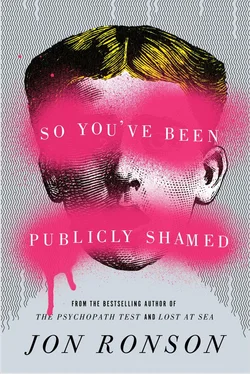In Goetz’s Wired magazine story—“Harnessing the Power of Feedback Loops”—he calls them “a profoundly effective tool for changing behavior.” And I’m all for people slowing down in school zones. But maybe in other ways feedback loops are leading to a world we only think we want. Maybe — as my friend the documentary maker Adam Curtis e-mailed me — they’re turning social media into “a giant echo chamber where what we believe is constantly reinforced by people who believe the same thing.”
We express our opinion that Justine Sacco is a monster. We are instantly congratulated for this — for basically being Rosa Parks. We make the on-the-spot decision to carry on believing it.
“The tech-utopians like the people in Wired present this as a new kind of democracy,” Adam’s e-mail continued. “It isn’t. It’s the opposite. It locks people off in the world they started with and prevents them from finding out anything different. They got trapped in the system of feedback reinforcement. The idea that there is another world of other people who have other ideas is marginalized in our lives.”
I was becoming one of those other people with other ideas. I was expressing the unpopular belief that Justine Sacco isn’t a monster. I wonder if I will receive a tidal wave of negative feedback for this and, if so, will it frighten me back again, to a place where I’m congratulated and welcomed?
“Feedback is an engineering principle,” Adam’s e-mail to me ended. “And all engineering is devoted to trying to keep the thing you are building stable.”
—
Soon after Justine Sacco’s shaming, I was talking with a friend, a journalist, who told me he had so many jokes, little observations, potentially risqué thoughts, that he wouldn’t dare to post online anymore.
“I suddenly feel with social media like I’m tiptoeing around an unpredictable, angry, unbalanced parent who might strike out at any moment,” he said. “It’s horrible.”
He didn’t want me to name him, he said, in case it sparked something off.
We see ourselves as nonconformist, but I think all of this is creating a more conformist, conservative age.
“Look!” we’re saying. “WE’RE normal! THIS is the average!”
We are defining the boundaries of normality by tearing apart the people outside it.
Bibliography and Acknowledgments
A note about the title. For a while it was going to be, simply, Shame . Or Tarred and Feathered . There was a lot of to-ing and fro-ing. It was a surprisingly hard book to find a title for, and I think I know why. It was something that one of my interviewees said to me: “Shame is an incredibly inarticulate emotion. It’s something you bathe in, it’s not something you wax eloquent about. It’s such a deep, dark, ugly thing there are very few words for it.”
My encounter with the spambot men was filmed by Remy Lamont of Channel Flip. My thanks to him, and to Channel Flip, and, as always, to my producer Lucy Greenwell. Greg Stekelman — formally known as @themanwhofell — helped me remember how Twitter mutated from a place of unself-conscious honesty into something more anxiety-inducing. Greg is not on Twitter anymore. His final tweet, posted on May 10, 2012, reads: “Twitter is no place for a human being.” Which I think is pessimistic. I still love the place. Although I’ve never been shamed on it. Although neither has he. That line about how we don’t feel accountable during a shaming because “a snowflake never feels responsible for the avalanche” came from Jonathan Bullock. My thanks to him.
I pieced together the story of how Michael Moynihan uncovered Jonah Lehrer’s deception mainly through my interviews with Michael — my thanks to him and to his wife, Joanne — though a little background came from “Michael C. Moynihan, The Guy Who Uncovered Jonah Lehrer’s Fabrication Problem,” by Foster Kamer, published in The New York Observer on July 30, 2012.
My information about Stephen Glass came from “No Second Chance for Stephen Glass: The Long, Strange Downfall of a Journalistic Wunderkind,” by Adam L. Penenberg, published by PandoDaily on January 27, 2014.
The story about Jonah’s trip to St. Louis the day before his downfall came from “Jonah Lehrer Stumbles at MPI,” by Sarah J. F. Braley, published on Meetings-conventions.com on August 2, 2012. In a telephone interview, Jonah Lehrer spoke with me at length and on the record. After our telephone interview, however, he expressed misgivings about being included in the book, saying he didn’t want to put his wife and family through the experience again. But his experience was too vital and too public — and the lessons learned too great — to leave out.
Thanks to Jeff Bercovici of Forbes magazine for putting me in touch with his friend Justine Sacco.
The life and work of Judge Ted Poe has been documented over the years by his nemesis the legal scholar Jonathan Turley in stories such as “Shame on You,” published in The Washington Post on September 18, 2005. I learned about the drunk drivers Mike Hubacek and Kevin Tunell from reading “A Great Crime Deterrent,” by Julia Duin, published in Insight on the News on October 19, 1998, and “Kevin Tunell Is Paying $1 a Week for a Death He Caused and Finding the Price Unexpectedly High,” by Bill Hewitt and Tom Nugent, published in People magazine on April 16, 1990.
I loved piecing together the history of group madness from Gustave LeBon to Philip Zimbardo. Five people were incredibly generous with their time and expertise — Adam Curtis, Bob Nye, Steve Reicher, Alex Haslam, and, especially, Clifford Stott. Clifford kindly talked me through the perils of deindividuation in two long Skype conversations. I recommend his book Mad Mobs and Englishmen? Myths and Realities of the 2011 Riots , cowritten with Steve Reicher and published by Constable & Robinson in 2011.
My research into LeBon’s history took me to Bob Nye’s book The Origins of Crowd Psychology: Gustave LeBon and the Crisis of Mass Democracy in the 3rd Republic , issued by SAGE Publications in 1975, and to Nye’s introduction to the Transaction Publishers’ reprint of the Dover edition of Gustave LeBon’s The Crowd , published in 1995. Some details about LeBon’s relationship with the Anthropological Society of Paris came from Nature and Nurture in French Social Sciences, 1859–1914 and Beyond, by Martin S. Staum, published by McGill — Queen’s University Press in 2011. I learned that LeBon’s fans included Goebbels and Mussolini from reading Fascist Spectacle: The Aesthetics of Power in Mussolini’s Italy , written by Simonetta Falasca-Zamponi and published by the University of California Press in 2000, and The Third Reich: Politics and Propaganda , written by David Welch and published by Routledge in 2002.
My research into Philip Zimbardo took me to “Rethinking the Psychology of Tyranny: The BBC Prison Study,” by Steve Reicher and Alex Haslam, which appeared in the British Journal of Social Psychology in 2006, and Dr. Zimbardo’s rebuttal, “On Rethinking the Psychology of Tyranny: The BBC Prison Study,” published in the same journal.
Dr. Gary Slutkin’s comments about the London riots being like a virus came from his article “Rioting Is a Disease Spread from Person to Person — The Key Is to Stop the Infection,” published in The Observer/The Guardian on August 13, 2011. The Jack Levin quotation came from “UK Riots: ‘We Don’t Want No Trouble. We Just Want a Job,’” written by Shiv Malik and published in The Guardian on August 12, 2011. It was Clifford Stott’s book and guidance that took me to both of those stories.
Читать дальше












